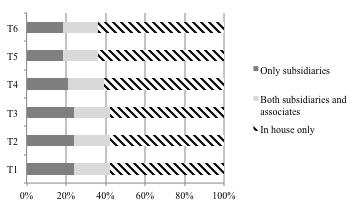Maryam Ghorbankhani and Federica Rossi
Government -funded research performed by public research organisations (PROs) not only advances the scientific frontier but also provides useful knowledge inputs for business innovation, which in turn can support businesses’ long-term economic competitiveness. Moreover, PROs are under increasing pressure to engage with external stakeholders within industry, the public sector, and society more generally. Thus, knowledge transfer management in these organisations is gaining increasing attention both from governments and academia. However, limited research exits about how they manage their knowledge transfer function.
In our study recently published in the Journal of Technology Transfer, we investigate under what conditions it is more effective for PROs to vertically integrate knowledge transfer management or to outsource it to specialist providers. We extend theory of firm boundaries to PROs and we outline a conceptual framework to describe how the ‘make or buy’ decision applies to a less studied context – the public research sector – and to a specific type of knowledge process – knowledge transfer from research performers to external stakeholders.
According to organisation theory, firms should integrate certain activities when they are complementary to other activities in ways that generate unique bundles capable to deliver competitive advantage. Extending this theory to PROs, we argue that they should integrate knowledge transfer management activities when these are uniquely complementary to their core research activity so that their bundling allows the PRO to achieve its institutional mission better than the unbundling of these activities and the outsourcing of knowledge transfer. In particular, we argue that the choice between vertical integration and outsourcing of knowledge transfer management influenced by two types of sources of unique complementarity between research and knowledge transfer:
- intrinsic complementarity (occurring when the knowledge transfer process requires unique tacit knowledge) and
- strategic complementarity (occurring when the nature of the knowledge recipients matters to the PRO).
We test our hypotheses using a unique, purposefully constructed panel dataset of 33 PROs in the United Kingdom for six financial years from 2011/2012 to 2016/2017, built from public annual reports and financial statements. We find that the probability of vertical integration increases in the presence of strategic complementarity and intrinsic complementarity, as we hypothesized. The former was proxied by variables capturing the extent of stakeholder influence on the PROs’ decisionmaking: stronger government influence on the PRO’s governance and presence of board members declaring external interests. The latter was proxied by variables capturing the presence of tacit knowledge: the share of PRO articles published in more applied journals and the lack of patenting.

Hence, our evidence suggests that the the more intrinsically and strategically complementary knowledge transfer is to research, the more likely knowledge transfer management is to be performed in-house.
Therefore, policies intending to encourage PROs to improve their knowledge transfer management capabilities should consider the heterogenous nature of PROs. PROs that carry out research that has high tacit knowledge component and those that intend to transfer knowledge to specific stakeholders, should be incentivised to improve their internal capabilities for knowledge transfer management. Other PROs, namely those that perform research whose outputs can be easily codified and those that aim to transfer knowledge to a broad variety of stakeholders, should be encouraged to rely on specialised suppliers. In the absence of such suppliers, some efforts should be invested in their creation, as they might ensure efficiency gains thanks to their scale and specialisation.
For more details about the study please see the full paper:
Ghorbankhani, M. and Rossi, F. (2022). Intrinsic and strategic complementarity of research and knowledge transfer activities as determinants of knowledge transfer management: evidence from public research organisations, The Journal of Technology Transfer.

